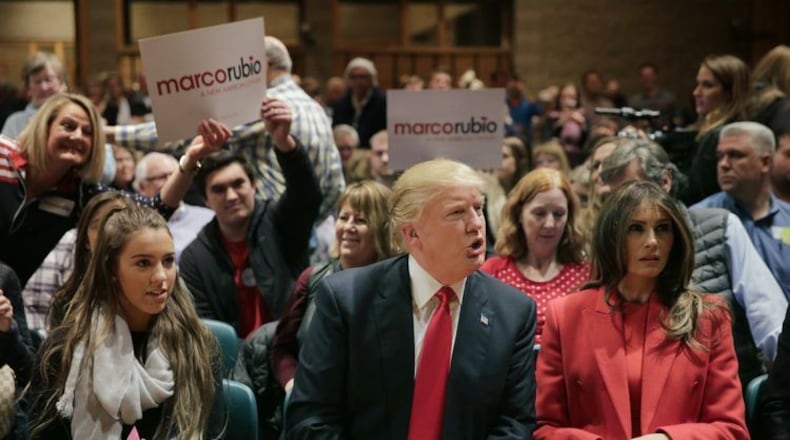On the Republican side of the Iowa caucuse s, the story is not that Ted Cruz won or that Marco Rubio finished in a stronger-than-expected third place. Both are important, but neither really compares to the story of the man in between them: Donald Trump.
He lost. Ergo, following his own usual reasoning, he's a loser.
Trump's entire campaign has been based on free airtime from TV networks chasing ratings a curious bit of circular logic: Trump is leading the polls because he's so great. How can you tell he's so great? Because he's leading the polls. No other candidate has referred to his own poll numbers more than Trump; it's possible that all other candidates, for all offices, combined, have referenced their own poll numbers less than The Donald. Winning begets winning. Ipso Trumpo.
Only now ... he's not winning. He's losing. The final poll average at Real Clear Politics had Trump at 29 percent and Cruz at 24 percent (although you really have to check out those trajectories toward the end). The results, with almost all precincts reporting, were the opposite: Cruz at 28 percent and Trump at 24 percent. That last set of numbers is the one that counts.
And, let's note, he fell to a disappointing second despite record turnout. For some time now, we've heard that turnout would be key to a Trump win. Well, the number of Republicans who voted Monday was more than 50 percent higher than in 2012. Trump got over 15,000 more votes than Rick Santorum did in his 2012 victory in Iowa . He still lost.
The story going forward remains about Trump, but it's no longer about Trump the unstoppable. It's about Trump the wounded. Now bloodied, does he keep his supporters in places like New Hampshire and South Carolina? If he's caught by a Rubio or a John Kasich in New Hampshire, and then by Cruz in South Carolina -- both of which are well within the realm of possibility -- where does his campaign turn for rejuvenation?
We're getting ahead of ourselves now. But make no mistake: No other top-tier candidate faces a make-or-break stretch over the next couple of weeks like Trump does.
***
OK, what of Cruz and Rubio? Well, they confirmed one thing: They are the only non-Trump candidates who can still win the GOP nomination.
Kasich is polling well in New Hampshire, where he has concentrated his resources, but he would face a series of uphill battles afterward. Ditto for Chris Christie. Ben Carson did a little better than expected in Iowa, but he was still merely in the single digits. Rand Paul and Jeb Bush simply haven't lived up to their famous names.
Cruz bet big on Iowa and was rewarded. He withstood birther attacks and won despite an unpopular (in Iowa) stand against the federal ethanol mandate. Exit polls show he won the votes of "very conservative" voters by 2-to-1 over Trump and 3-to-1 over Rubio. That's his constituency going forward. He is all but certain now to be, at least, one of the last two Republicans standing.
He did much worse, however, among the slightly larger "somewhat conservative" crowd. That's the Rubio crowd; the Floridian won it by 5 points over Trump and 10 over Cruz. For all the talk of Rubio as the "moderate" "establishment" candidate (if he embodies those words today, conservatives and outsiders have officially won) his sweet spot is really in between "very conservative" Republicans and moderates. That's a good place to be. The fact that he won a plurality of that group -- and, yes, finished with a much larger share of the overall vote than expected -- bodes well for his campaign going forward. But expectations have been raised for him. His third place will look a lot less shiny if it doesn't carry him to greater heights later this month.
Perhaps the strangest result of all, from the exit polling, is this: Donald Trump won a plurality of the moderate vote with 34 percent; Jeb Bush finished sixth in that category with 5 percent. Bush actually got less of the moderate vote than Kasich, who virtually ignored Iowa in favor of New Hampshire. I don't know much, but (I think) I know these things: Trump can't win the nomination doing best among moderates, and Bush can't win it as an also-ran among moderates.
About the Author
The Latest
Featured



